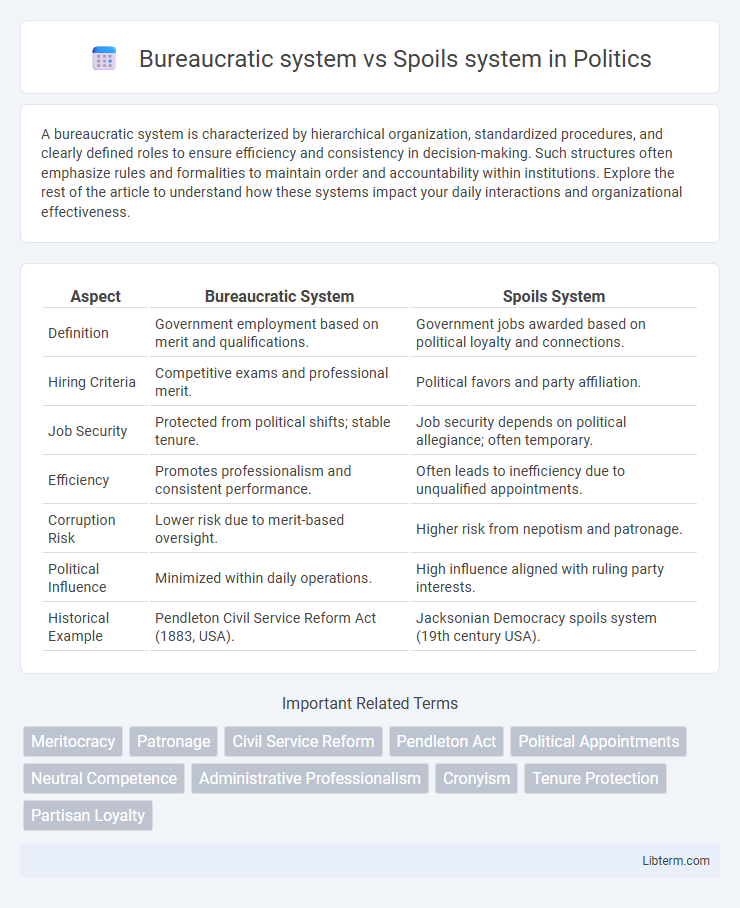A bureaucratic system is characterized by hierarchical organization, standardized procedures, and clearly defined roles to ensure efficiency and consistency in decision-making. Such structures often emphasize rules and formalities to maintain order and accountability within institutions. Explore the rest of the article to understand how these systems impact your daily interactions and organizational effectiveness.
Table of Comparison
| Aspect | Bureaucratic System | Spoils System |
|---|---|---|
| Definition | Government employment based on merit and qualifications. | Government jobs awarded based on political loyalty and connections. |
| Hiring Criteria | Competitive exams and professional merit. | Political favors and party affiliation. |
| Job Security | Protected from political shifts; stable tenure. | Job security depends on political allegiance; often temporary. |
| Efficiency | Promotes professionalism and consistent performance. | Often leads to inefficiency due to unqualified appointments. |
| Corruption Risk | Lower risk due to merit-based oversight. | Higher risk from nepotism and patronage. |
| Political Influence | Minimized within daily operations. | High influence aligned with ruling party interests. |
| Historical Example | Pendleton Civil Service Reform Act (1883, USA). | Jacksonian Democracy spoils system (19th century USA). |
Introduction to Bureaucratic and Spoils Systems
The bureaucratic system is characterized by a structured hierarchy, defined roles, and merit-based appointments ensuring efficiency and professionalism in government operations. The spoils system, in contrast, involves awarding government jobs to political supporters and allies as rewards for loyalty, often leading to patronage and nepotism. Understanding these contrasting approaches highlights the evolution of public administration from partisan favoritism toward meritocracy.
Historical Origins and Development
The bureaucratic system originated during the 18th and 19th centuries, particularly influenced by the reforms of Max Weber, emphasizing merit-based recruitment, hierarchical structures, and rule-bound administration to ensure efficiency and impartiality in government. In contrast, the spoils system emerged in early 19th-century United States politics, most notably under Andrew Jackson's presidency, where political loyalty was rewarded with public office appointments, promoting patronage over qualifications. Over time, the bureaucratic system developed as a response to the inefficiencies and corruption associated with the spoils system, leading to civil service reforms such as the Pendleton Act of 1883 that established meritocratic principles in government employment.
Core Principles of the Bureaucratic System
The bureaucratic system is characterized by a structured hierarchy, established rules, and a merit-based approach to hiring and promotion, ensuring efficiency and consistency in government operations. This system emphasizes specialization, professional expertise, and impartiality, minimizing favoritism and political influence. In contrast, the spoils system prioritizes political loyalty over competence, often leading to patronage and less effective administration.
Key Features of the Spoils System
The Spoils System is characterized by the practice of awarding government jobs to political supporters and loyalists, often regardless of their qualifications. This system emphasizes patronage and rewards, fostering loyalty to the ruling party rather than merit-based appointments. It often leads to inefficiency and corruption due to appointments based on political connections instead of expertise.
Advantages of Bureaucratic Administration
Bureaucratic administration ensures consistency and impartiality in government operations through standardized rules and procedures, promoting efficiency and accountability. Its hierarchical structure allows for clear delegation of responsibilities and expertise, reducing corruption and favoritism often seen in spoil systems. This systematic approach supports long-term policy implementation and stability in public service delivery.
Drawbacks of the Spoils System
The spoils system often leads to widespread corruption and inefficiency by prioritizing political loyalty over merit and qualifications, resulting in unqualified individuals occupying crucial public service positions. This system undermines institutional stability as frequent turnover disrupts continuity and expertise within government agencies. Public trust erodes when appointments are seen as rewards for partisan support rather than based on competence, weakening the overall effectiveness and accountability of governmental operations.
Impact on Government Efficiency and Accountability
The bureaucratic system enhances government efficiency and accountability through merit-based hiring, clear hierarchical structures, and standardized procedures that reduce corruption and promote consistent policy implementation. In contrast, the spoils system often undermines efficiency and accountability by prioritizing political loyalty over competence, resulting in frequent turnover, patronage appointments, and increased risk of corruption. This leads to inconsistent decision-making and hampers the development of a professional, stable, and transparent government workforce.
Modern Reforms and Civil Service Laws
Modern reforms in the bureaucratic system emphasize merit-based hiring, transparency, and professionalization, contrasting sharply with the spoils system's practice of awarding government jobs based on political loyalty. Key civil service laws such as the Pendleton Civil Service Reform Act of 1883 established competitive exams and protection from political patronage, significantly reducing corruption and improving efficiency. Ongoing reforms continue to reinforce accountability and performance standards within the public sector, advancing a more impartial and effective bureaucracy.
Case Studies: Global Examples of Both Systems
The bureaucratic system is exemplified by Germany's merit-based public administration, where structured recruitment and promotion ensure efficiency and professionalism in governance. In contrast, the spoils system in the United States during the 19th century, particularly under President Andrew Jackson, demonstrated how political appointments favored loyalty over competence, leading to widespread patronage and corruption. Contemporary comparisons show Singapore's bureaucratic approach fostering stability and development, while some developing countries struggle with spoils system remnants that hinder institutional growth.
Conclusion: Toward Transparent and Effective Governance
Transparent and effective governance requires minimizing the inefficiencies of both bureaucratic and spoils systems by promoting merit-based appointments and accountability. Implementing clear regulations and oversight mechanisms enhances public trust and ensures that public resources are managed responsibly. Emphasizing transparency in bureaucratic processes and reducing partisan favoritism leads to improved service delivery and long-term institutional stability.
Bureaucratic system Infographic

 libterm.com
libterm.com